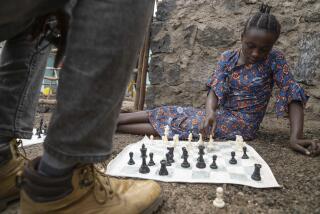CHESS AND THE INTERNET
Chessplayers are using the Internet in a variety of ways. First, naturally, to play chess at any hour without leaving one’s home. There are dozens of Websites that serve as tournament directors, electronically connecting pairs of players, timing the games, recording the results and calculating ratings. Players who prefer a slower pace may transmit their moves via e-mail, an improved form of postal chess.
The best international tournaments now offer “live” Internet coverage. Fans around the world can see each move on their computer screen, mere seconds after a grandmaster has played it. Sometimes the coverage includes commentary or the chance to voice your own opinion about the position.
Other sites store the moves of master games in Portable Game Notation (PGN), a form of algebraic chess notation that computers can read. Users can download PGN files and create databases of more than a million games. The demand for bigger databases has sparked interest in older games, especially the lesser-known efforts of legendary players.
There are separate newsgroups devoted to chess news, chess analysis and chess politics. If you have a modem, you can join the discussion on almost any chess topic. Most contributors are civil.
If you want information about upcoming chess events, you can obtain it quickly through the Internet. Many chess organizations now rely on the Internet to help publicize their schedule of tournaments. Here are addresses of a few worthwhile sites.
The U.S. Chess Federation (https://www.uschess.org) provides thorough coverage of chess in this country.
The World Chess Federation’s site (https://www.chessweb.com) publishes brief reports daily on international tournaments.
Closer to home, the Southern California Chess Federation’s new site (www.geocities.com/Colosseum/Field/8184) announces local events and maintains a list of local chess clubs.
Another local effort, Chess Chronicles, (www.freeyellow.com/members/cchess) offers some chess humor and a broad selection of links to other sites.
LOCAL NEWS
The California Grade Level Championship, held April 19 in Castaic, attracted an excellent turnout of 235 players. The 1998 champions are: David Benitez, grade 12; Patrick Falconer, grade 11; Alex Huff, grade 10; Kyle Sellers, grade 9; Kevin Sevilla (on tiebreak over Andrew Findlay and Hakop Tataryan), grade 8; Minas Nordanyan, grade 7; Austin Ong, grade 6; Alen Melikadamian, grade 5; Kevin Scott, grade 4; Daniel Schwarz, grade 3; Alexander Setzepfandt, grade 2; David Arabyan, grade 1; and Sean Bowe, a preschooler who won the kindergarten section.
Jay Stallings of the California Youth Chess League organized the tournament. The sponsor, Think Mental Performance Foods, distributed free samples of its products and awarded many prizes.
The season of scholastic tournaments concludes with the National High School Championship, scheduled May 8-10 at the Wyndham Hotel, 6225 W. Century Blvd. in Los Angeles. It’s a seven-round tournament, open to all students in grades K-12. For more information, call the U.S. Chess Federation at (914)-562-8350.
Robert Hurdle scored 7-1 to win the 40-player Santa Monica Bay Chess Club Championship. A point behind were master Ric Kaner and Class A winners Gersh Fleischman and Charley Said-Nejad. Other class prizes went to Ed Cohen, Ron Hanoian, Martin Neumayer, Bennie Bivens and Joaquim Astorga.
The club, which meets at 7:00 p.m. Mondays in Joslyn Park, 633 Kensington Drive in Santa Monica, will begin three-round quad tournaments on April 27. For details, call Mike White at (310) 446-3044.


